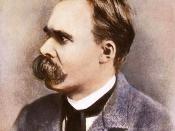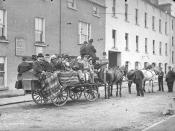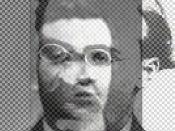Friedrich Nietzsche never wrote a single essay on politics, yet his philosophical works transcended into political theory, and even influenced Nazi Germany. His philosophical writings have been accredited by David Walsh as an early alarm to then upcoming world wars, by foreseeing the upcoming disintegration of human morality after its falling out with the notions of absolute truth, and the church. After two millennia of the Christian church's influence on politics, society parted ways with the dogmatic past, but never evolved to the challenges of a world where people quit believing in the church without a new supplementation of morality. Religion was once closely followed, but after the Enlighten it lost its meaning on the world. Instead of religion playing a role as a basis for moral framework, it instead was only used to further power (i.e. manifest destiny and the extermination of the natives).
The Death of GodThe phrase the "Death of God" is one of the most recognizable quotes by Nietzsche.
It also reminds any reader of Nietzsche that he has the ability to sum up a global transitional in three easily misinterpreted words. The phrase doesn't literally mean that there was once a God and now he is dead, instead it is a reference to a world whose basic ideals are no longer buttressed on the idea of an absolute truth. The metanarrative of an absolute truth, and basing all philosophical teachings on this notion was a recognizable phase of humanity to Nietzsche given the pretext of the modern world shifting away from strict conformity with the Church. He predicted a gradual disappearance of morality over the 20th and 21st century in Europe (Arnhart). David Walsh believes that God became unrecognizable in the modern world (Duetsch and Fornieri 469). Nietzsche explained that, "As the will to truth...


